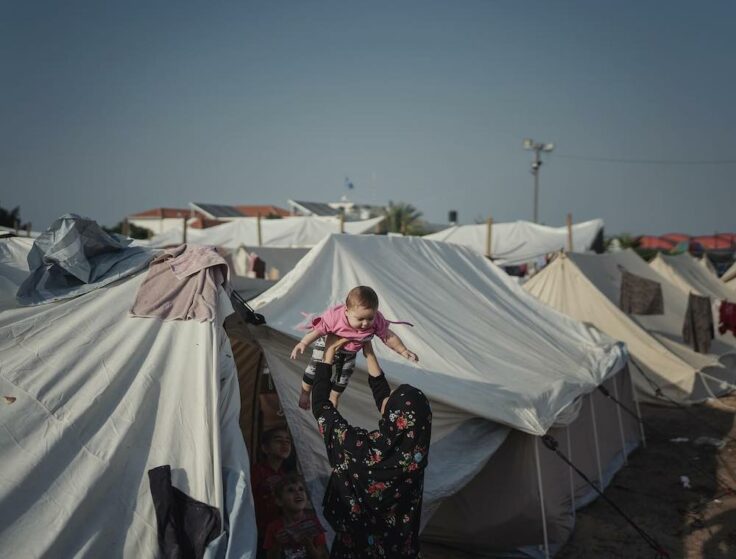As the humanitarian crisis in the Occupied Territories worsens, it is being reported that pregnant women in Gaza are having to undergo emergency C-sections without anesthesia, on the floor and under cellphone light as electricity has been cut off by occupying forces. Last week, a harrowing video emerged online of a doctor at Nasser Hospital performing the procedure on a woman named Raneem Hejazi, who was 32-weeks pregnant when she was nearly killed by an Israeli airstrike in southern Gaza. After being rescued from under the rubble, Dr. Mohammad Qandeel, who didn’t have clean water to wash his hands nor antibiotics to prevent infections (some doctors have even resorted to using vinegar for antiseptic), performed the emergency C-section guided by only the light from his cellphone to safely deliver her unborn child. Fortunately, the baby survived— it was named after a family member who died due to an Israeli airstrike.
Hijazi, who lost her arm and broke both her legs during the attack, wasn’t the only woman to undergo an emergency C-section that day. Only a few miles away at another hospital in Gaza, another baby was delivered at 32-weeks via C-section from a dying pregnant woman who had been hit by an Israeli airstrike. The baby is the last surviving member of his entire family.
Due to Israel’s constant bombardment of the Gaza Strip and the ongoing blockade preventing medical supplies, food, water, and fuel from entering the densely-populated enclave, more and more pregnant women are expected to give birth without anesthesia while Gaza’s health system is on its knees. At least 12 out of 35 hospitals in Gaza and nearly two-thirds of primary healthcare clinics have shut down since the start of hostilities due to damage or lack of fuel, adding to additional strain on the remaining health facilities that are still functioning.
According to The United Nations’ sexual and reproductive health agency, UNFPA, 50,000 pregnant women have been caught up in the conflict in Gaza, with more than 160 deliveries every day. As a result of shock and extreme stress, many pregnant Gazans are experiencing miscarriage and premature labor. The premature babies who survive and go on to rely on mechanical ventilators to help them breathe also face imminent death once the generators that depend on the dwindling fuel stop working.
What’s more, women who don’t require critical care after delivering are often discharged from the hospital within hours due to overcrowding. Keep in mind, the average hospital stay after a C-section is two to four days, and as over 40% of Gaza’s population is now homeless after Israeli airstrikes destroyed their place of residence, many of the women have to seek refuge in shelters, where conditions aren’t always sanitary.
Civilians and healthcare workers have had to resort to unhealthy and oftentimes dangerous coping methods to adapt to the inhumane blockade. Women and girls in Gaza have been chemically-delaying their periods due to the lack of sanitary products such as pads and tampons, in addition to having no access to water to maintain their hygiene. According to the United Nations Children’s Fund (UNICEF), Gaza’s water facilities are currently pumping five percent of their pre-war daily output. Only three litres of water a day are currently available per person in Gaza for basic health requirements — the recommended minimum daily amount is 50 litres.
Existing problems are only exacerbated by the dirty water many have been forced to use since Israel cut off the water supply. Many mothers are mixing baby formula with the contaminated water to feed their infants, contributing to rising cases of babies in danger.
Lack of clean water also means that doctors, who are doing everything they can to stabilize patients amid the total collapse of Gaza’s health care system, are having to disinfect wounds with a mixture of saline and the polluted water that trickles from taps, which could result in more infections.
Since Oct. 7, over 9,000 Palestinians have died, with half of them being children, reports the Palestinian Health Ministry. More children have been killed in just over three-weeks in Gaza than in all of the world’s conflicts combined in each of the past three-years, says non-profit organization Save the Children.
According to James Elder, a spokesperson for UNICEF, “Gaza has become a graveyard for thousands of children.”
Photo by Motaz Azaiza.









